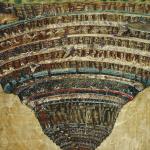
A wise man’s heart is at his right hand,
But a fool’s heart at his left. Eccl 10.2, NKJV
The “heart,” the inner man or soul, of the wise man or fool is revealed by which direction he turns. “The right side is portrayed as the good alternative, and the left side as the evil one. Thus Eccl 10:2 reads, ‘A wise man’s heart is at his right hand; but a fool’s heart at his left’” (R. Laird Harris, Gleason L. Archer, and Bruce K. Waltke, eds., Theological Wordbook of the Old Testament, vol. 2, Moody Press, p. 878).
The author of Ecclesiastes is more than likely Solomon, although he always refers to himself as Koheleth (teacher or preacher). He contrasts two different lifestyles, this time portraying the fool and the wise (Ecclesiastes 10). We will focus on Eccl 10.1-12.
i. the way of the fool
Even as he walks along the road,
the fool lacks sense
and shows everyone how stupid he is. Eccl 10.3, NIV
The way of the fool is apparent to all. “He walks along the road” or “by the way” (KJV). This terminology suggests not only a physical journey, but a way of life.
The fool “lacks sense” (NIV) or “his wisdom faileth” (KJV). This phrase, in conjunction with the term fool, does not point to a mental deficiency. This is someone who is characterized by making decisions that are not life-giving, decisions that do not lead to God.
This person shows himself to be a fool to everyone, every time he steps foot outside of his house. Can you think of some differences between making one foolish decision, starting a lifestyle of folly, and eventually developing a reputation for making wrong choices? In short, what do our actions reveal about our inner character?
ii. grace under fire
If a ruler’s anger rises against you,
do not leave your post;
calmness can lay great errors to rest. Eccl 10.4, NIV
This translation captures the meaning behind the Text. The picture is one of a counselor, offering advice to a king or ruler. The ruler reacts against the counsel, perhaps even showing his anger or “spirit” (KJV).
A foolish or a wise choice must be made by the counselor. Out of embarrassment, the counselor can easily quit and leave the court in shame. The alternative is to remain calm, maintain the position, and possibly correct any misunderstanding or error.
Our wisdom is revealed when we exhibit grace under fire. In our relationships, do we typically think of problems with a linear or a cyclical focus? It seems to be human nature to pass the blame, so we often think linearly.
“Because he did that to me I reacted this way. It is his fault!” Koheleth shows that our interactions are far more entwined. One offers counsel, that produces a negative reaction, that produces another negative reaction to the first negative reaction.
If this continues, it becomes a dangerous cycle. In what new way does Koheleth ask us to break this cycle? How can we recognize and break negative cycles in our relationships?
iii. unjust reward
The New International Version groups the next three complimentary thoughts together. At times fools and the nobles receive an unjust reward. They are not recognized properly.
There is an evil I have seen under the sun,
the sort of error that arises from a ruler:
Fools are put in many high positions,
while the rich occupy the low ones.
I have seen slaves on horseback,
while princes go on foot like slaves. Eccl 10.5-7
This “error” is actually one of the terms for sin in the Hebrew language (verse 5). This is unintentional sin, although there is no excuse for this unjust reward. “It is a moral perversion when folly is dignified and those of no account are elevated to leadership while those to whom honor is due are demeaned (Eccl 10:6)” (R. Laird Harris et al., Theological Wordbook, p. 625).
iv. understanding slavery or servanthood
The term “slaves” or “servants” does not necessarily carry the same meaning we assign to it today (Eccl 10.7). Even slaves had rights in Israel. They were only allowed to serve for 6 years.
If mistreated, or if they would die, then their master would be held liable. If abused, the slave could win his freedom. Although it is still slavery, Israel’s ancient system is different than our modern understanding.
If the term is translated “servant, then there are other implications. The term servant is also a title showing fealty to both God and king, i.e your servant. Servant is also used as a prophetic term, primarily in Isaiah, regarding the Messiah.
No matter how much we try to understand slavery, there is an understanding of the dignity of the human we have all come to realize. Slavery is a sin. However, ancient Israel seems to be generous in their treatment and protection of slaves, long before their time.
On the other hand, in Koheleth’s example servants ride horses and nobles walk (Eccl 10.7). Horses are fine animals, associated only with the wealthy during that era. To ride a horse is to hold a position of prestige and honor.
The point Koheleth is making is not this diatribe against slaves or foolish rulers who give them honor. This is not a simple report of injustice, but an injunction to honor those who deserve it. We are to be fair in our dealings with others.
Paul offers a similar thought.
Render therefore to all their due: taxes to whom taxes are due, customs to whom customs, fear to whom fear, honor to whom honor. Romans 13.7, NKJV
In context, he is dealing with nobility of sorts like Solomon, the civil servants of his era.
notes
Pic credit: Marta Esteban Fernando | Two people on a hilly stroll | 11.03.14 | upsplash.com
For other pieces in this series visit the category Archives / The Writings CLICK HERE
If you’re want to have my articles delivered to your doorstep, and receive a FREE e-book, sign up for my email list CLICK HERE













